How to Raise and Care for Pygmy Goats
A Great Pet for Kids
Pygmy goats are great pets to own, provided you have lots of yard space or
live in a rural locale. Rather than raising them for their milk or meat, owners
usually adopt them for show and companionship. The goats, which are often
featured in petting zoos, make ideal pets for kids. In particular, kids like
raising the miniature goats as part of their 4-H activities because the animal
is easy to maintain and is friendly and affectionate.
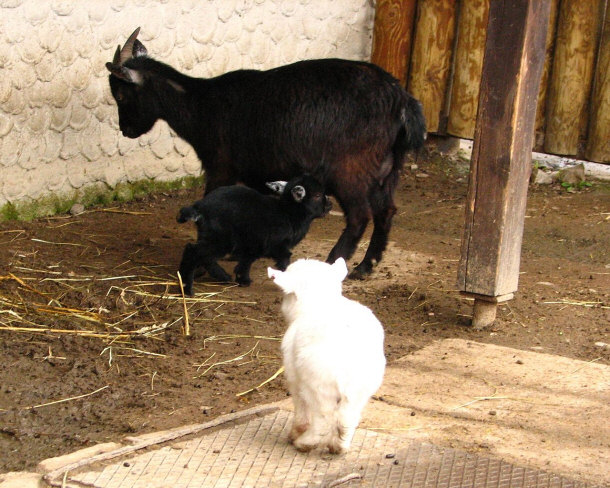
By Mistvan (Own work) [GFDL or CC-BY-SA-3.0-2.5-2.0-1.0],
via Wikimedia Commons
Castrated male goats, or wethers, make the best pets as they are mainly concerned about getting fed or
receiving attention.
Characteristics and Varieties
Pygmy goats, when fully grown, will stand around a foot and a half tall at
the withers and weigh around 50 to 65 pounds. Because the goats are herd
animals, youíll want to purchase more than one of them. The goats come in one of
a number of varieties, including the agouti, whose hue can range from a silvery
gray to black. Stockings on the goat are a darker shade than the body color. The
caramel, another type of pygmy, is lighter colored and can range in color from
white to tan. The goat exhibits light stripes that run vertically in front of
their dark stockings.
Hand-rearing Pygmy Goat
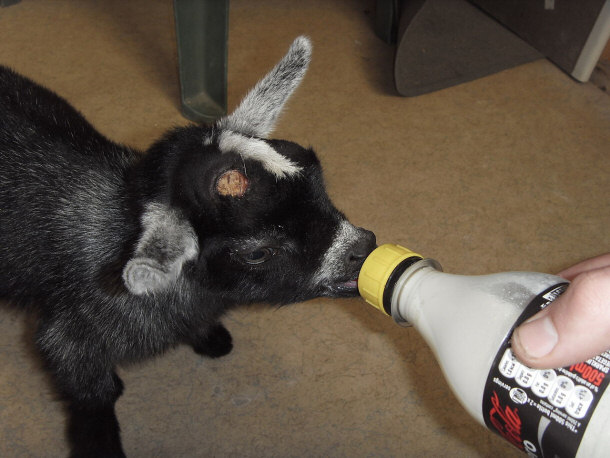
By Wilder836 (Own work) [CC-BY-SA-3.0],
via Wikimedia Commons
Goats are also available in black and solid black.
An Animal Indigenous to Western Africa
Originating in Western Africa, the goat hails from the Cameroon Valley. It
was imported into the U.S. in the 50s, and was used for research purposes and
for exhibition in zoos. Originally, the pygmy was referred to as the Cameroon
dwarf goat.
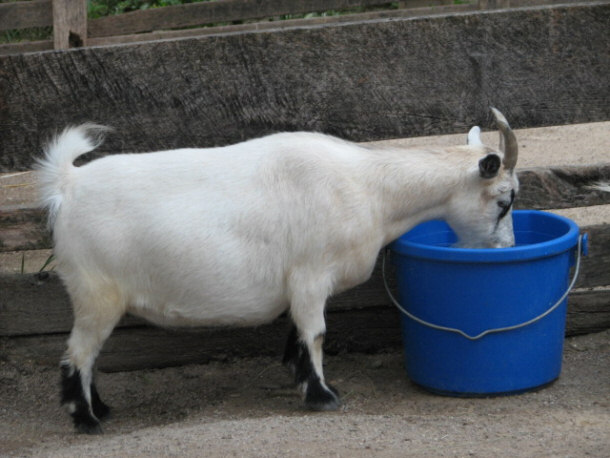
By Kevin Payravi (Own work) [CC-BY-SA-3.0 or GFDL],
via Wikimedia Commons
Caring for Your Pygmy Goats
Build a Shelter or Shed
You can raise a pygmy almost anywhere as the goat is adaptable to almost any
climate. However, that being said, make sure you provide a shelter for your
goats in the form of a shed or similar structure and keep them adequately warm
during the wintertime. Warm their food and water during the colder times of the
year and make sure that their indoor living area is free from any chills or
drafts.
Pygmy Goat Shed:
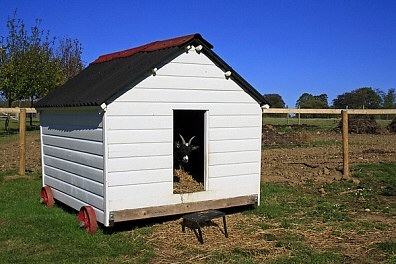
The Size of the Shed: Housing Dimensions
The housing for your goats then should stand around three feet high and
measure 4í x 4' for two goats, or 8í x 10í for a herd of four.
Construct or Install a Sleeping Platform
Include a sleeping platform as goats usually do not want to sleep on the
ground. Place the feeding and watering station (or hay rack) inside and off the
ground as well. Goats will not eat food or drink water that isnít fresh or
clean. Fresh water should be provided daily.
Install Predatory-proof Fencing
Make sure the housing is well-ventilated during the warmer times of the year
and that the fencing you use around the shed area is predatory-proof. Therefore,
the fencing should protect your goats from coyotes, dogs, and similar predators.
Non-climb wire of about four feet high or six-foot-high fencing should offer
sufficient protection.
Make Sure Fencing is small Enough for Young Pygmy Goats:
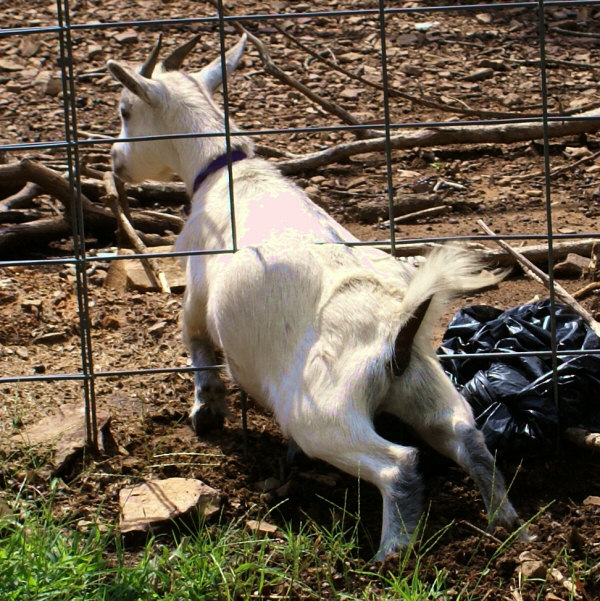
By Belinda Hankins Miller
via Wikimedia Commons
Meeting Your Goatsí Nutritional Requirements
In addition to a daily, fresh water supply, pygmy goats also have certain
nutritional requirements too. Principally, the little goats need vitamins,
minerals, protein, and energy. More protein is needed for baby goats or does
that are either pregnant or lactating. Food in the form of clover hay or alfalfa
will supply their protein needs and rolled or whole grains will provide them
with extra stores of energy.
Pygmy goats also require sufficient quantities of vitamin A and D. Vitamin A
can be found in yellow corn as well as green hay. Feed your goats sun-cured hay
so they obtain their nutritional quota of vitamin D. Mineral requirements can be
met by feeding them either alfalfa hay or whole grain.
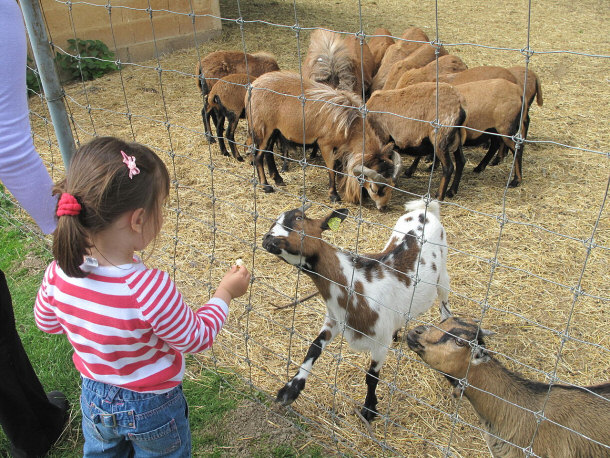
However, donít expect your pygmy to act as a lawnmower. Unlike other goats,
their feeding requirements donít extend that far. So, basically, food should
consist of alfalfa grass or hay, a daily fresh water supply, as well as a salt
block for a balanced diet. Bucks or wethers should not be fed grain unless itís
breeding season or they are in a phase of growth.
Preventing Urinary Calculi
Buck kids tend to get urinary calculi or kidney stones. To lessen the
occurrence, they shouldnít be castrated until they turn four months old. As
giving grain to wethers can also cause urinary calculi, some owners choose to
forego giving the feed to the goats at all.
Requirements for Feeding Grain
If bucks are given grain, about one-half of a cup is sufficient. Pygmy kids
receive about half that amount while does that are producing milk should receive
three feedings daily. Stop feeding the does grain in the summertime.
Give Your Goats Pastureland or Plenty of Room to Play and Roam
If you can provide your pygmy goats with an expanse of natural pasture, all
the better. That way, you wonít need to supply as much hay or grain to ensure
they receive their nutritional requirements. Indeed, itís nice to provide
natural pastureland for your goats as they are, as mentioned, herd animals. Not
liking a solitary existence, the animals love playing, grazing, climbing, and
happy companionship.
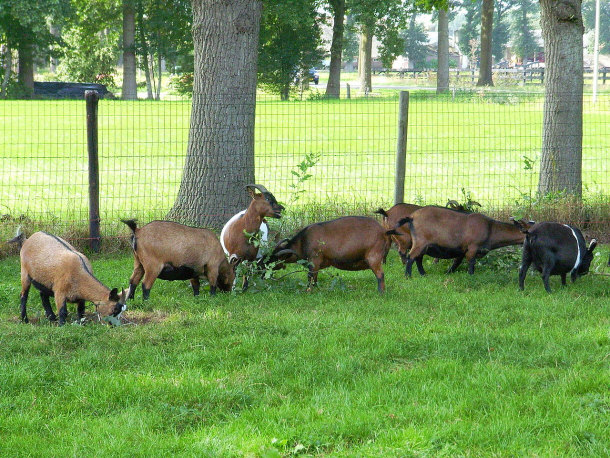
By Roelzzz
via Wikimedia Commons
Generally, if youíre considering adopting the goats as
pets, itís best to select two wethers or neutered males.
Breeding Pygmy Goats
If pygmy goats are bred, the gestation period lasts just over five months or
around 155 days. One to four kids are born about every 12 months. Does typically
breed for the first time at around 12 months of age. However, if you donít
separate them from the bucks, they can conceive as young as two months old. Kids
that are just born nurse shortly after birth and start eating hay within several
days. The young are weaned at about three months.
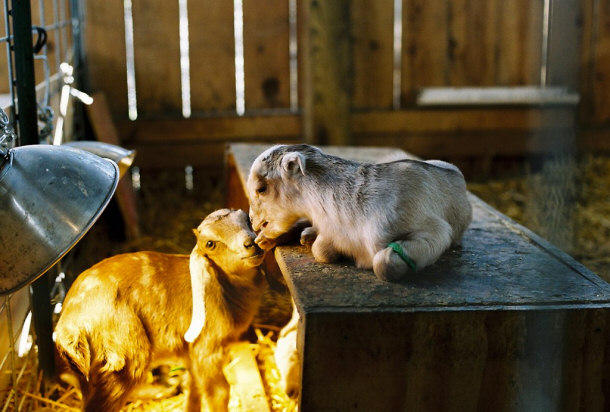
While kiddings can occur as
much as twice annually, breeders usually confine breeding to once a year so does
can recuperate.
Life Expectancy
Pygmy goats can live as long as 15 years, with the average lifespan hovering
around 12 years.
Exhibiting Your Goats at Shows: Grooming and Handling Tips
If you show your pygmy goat, its hooves should be trimmed and it should be
bathed. Use a dog collar and a lead.
Young Pygmy Goat
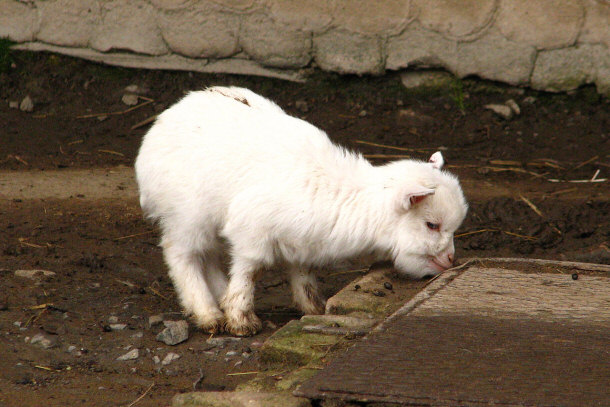
By Mistvan
via Wikimedia Commons
Trim the hooves of pygmy goats every two
months with a hand pruner, regardless of whether you show them or not.
Pets
Top Lists:
18 Richest Animals in the World
15 Exotic Pets You Could Own Today
Top 20 Common Substances That Are Toxic to Cats and Dogs
Informational:
Animal Actors: Pets in the Film, TV, and Print Industry
Caring for a Yorkshire Terrier: Facts You Should Know
Caring for a Pig as a Pet: The Pot-bellied Pig and the Micro Pig
Difference Between a Cat Person And a Dog Person
Should You Microchip your Cat or Dog?
How to Raise and Care for Pygmy Goats
Caring for Unique Pets: The Leopard Gecko
Use Food-Grade Diatomaceous Earth to Kill Fleas Naturally
Dogs:
Top Lists:
Top 15 Dog Breeds For Home Protection
15 Fascinating Facts About The Mastiff
Informational:
How To Teach Your Dog to Hunt for Truffles
Caring for an English Bulldog: Tips and Basic Info
Cranial Cruciate Ligament (CCL) Tears in Dogs: Treating the Injury
How To Keep Your Dog free of Heartworm Disease
Dog With Separation Anxiety?
Cats:
Top Lists:
Top 6 Qualities in an Awesome Cat
Informational:
How to Control Fighting Felines
How to Get Your Cat to Exercise
Fish:
Fish 101 for the Hobbyist: The Fishís Body and Senses
Buying a Saltwater Aquarium: What You Need to Know
Graduating to a Saltwater Tank
|